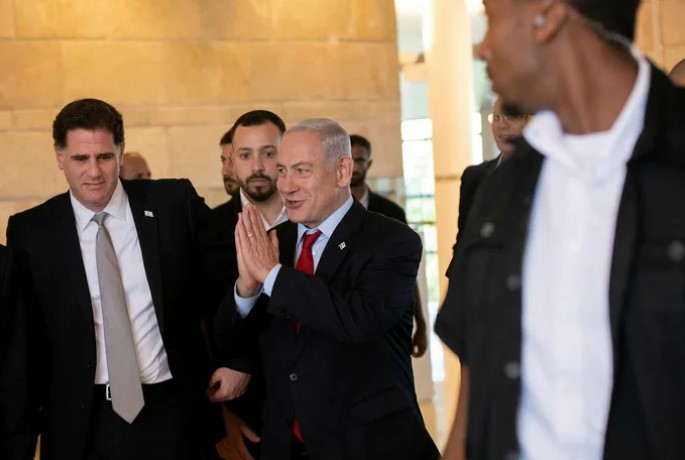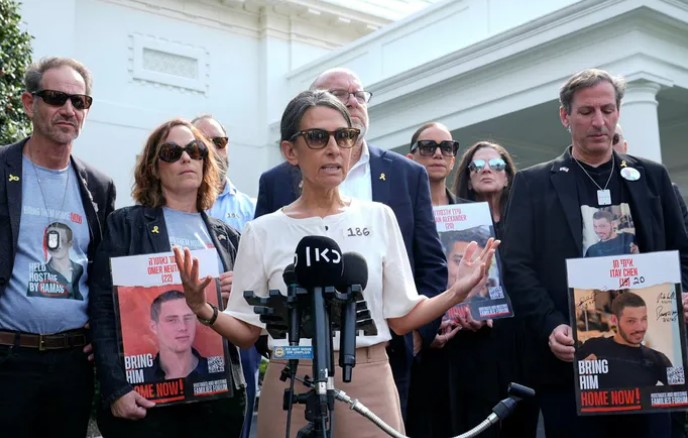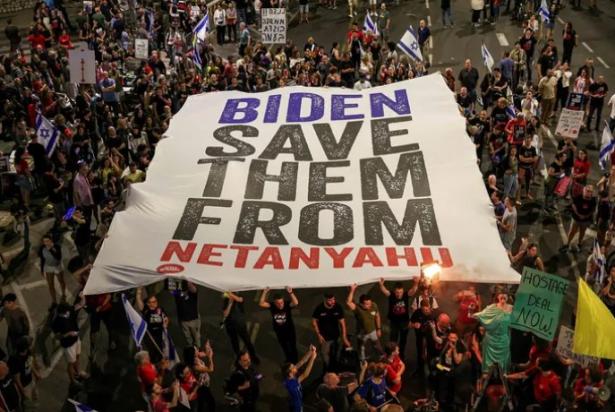Rattled by Global Rebuke, Netanyahu Scrambles To Fend Off Charges of Sabotaging Hostage Deal
Prime Minister Benjamin Netanyahu is concerned about the growing international criticism of his conduct of the negotiations for the release of hostages being held by Hamas in Gaza.
The prime minister has invested considerable effort over the past day to dispel accusations that he has been scuttling a hostage and cease-fire deal due to his own political considerations.
On Wednesday evening, he held a news conference for the foreign press corps in Israel, in which he again highlighted the importance that he attaches to Israeli control of the Philadelphi corridor, which runs along the border between the Gaza Strip and Egypt.
He and his associates also saw to it, to individually brief senior political commentators on the subject. In addition, Strategic Affairs Minister Ron Dermer, who is a close associate of the prime minister, gave a series of interviews with American media outlets in a bid to explain the Israeli prime minister's position.
Until very recently, the Biden administration had publicly adhered to the line that Netanyahu was interested in coming to a hostage release agreement and that the primary obstacle to achieving it was Hamas.
Over the past several weeks, however, the tone has changed, as reflected in harsh criticism by White House National Security Communications Advisor John Kirby of Finance Minister Bezalel Smotrich. Kirby even accused of endangering the lives of American citizens, due to Smotrich's opposition to a deal on the release of the hostages, who include American citizens.
At the beginning of the week, after the Israeli security cabinet passed a resolution prioritizing holding onto the Philadelphi corridor over the return of the hostages who are still alive, President Joe Biden said that Netanyahu wasn't doing enough to secure a hostage deal.

The president's comments came amid harsh criticism by Arab countries, including the United Arab Emirates and Saudi Arabia, over the Israeli prime minister's handling of the negotiations. The prime minister generally boasts about the two Arab countries' relationship with Israel.
In addition, senior German government officials told Axios journalist Barak Ravid that there is also growing frustration in Berlin over how Netanyahu is handling the hostage issue. This is the first time since the outbreak of the war in Gaza on October 7 that an official source in Germany, the most important country in Europe, has pinned part of the responsibility for the stalemate in the hostage talks on the Israeli side.
Netanyahu and his associates are also concerned about the increasing coverage in the international press, particularly by prominent U.S. media outlets, of the hostage families' tough criticism of the prime minister.
Over the past several days, leading American television stations have featured interviews with a number of the Israeli hostages' relatives in which they attacked the prime minister, accusing him of not doing enough to achieve a deal. The message was brought into relief following the murder last week in the Rafah area of Gaza of six hostages, including Hersh Goldberg-Polin, who was an American citizen.
The massive protests this week in Israel in opposition to Netanyahu's conduct and calling for a hostage deal received wide coverage in the American media. In addition, the internal differences of opinion among Israel's political and military leadership on the hostage issue have been attracting greater public attention than in the past. On Wednesday, the front page of the Washington Post featured comments by a senior Israeli official who accused Netanyahu of partial responsibility for the deaths of the hostages.

For his part, Joe Scarborough, a prominent American television host and commentator and a former Republican Congressman, made on-air remarks describing the Israeli prime minister as a corrupt leader who was prioritizing his own political needs over the fate of the hostages.
The group of hostage families associated with the protests across from the Defense Ministry's headquarters in Tel Aviv has been maintaining social media accounts in English aimed at pressing American Jewish organizations to step up their public criticism of Netanyahu on the hostage issue.
The families also plan on talking to members of Congress who have expressed a commitment in recent months to work for the hostages' release – to urge the lawmakers to press Netanyahu to accord priority to the hostage issue.
The lively discourse in the American media over the extent to which the Israeli prime minister is responsible for the failure of the hostage negotiations so far might also influence how the issue is perceived in the U.S. presidential campaign.
The Republican candidate, former President Donald Trump, castigated President Biden and Vice President Kamala Harris over the killing of the six hostages.
For their part, however, the president and vice president spoke personally to the parents of the slain American hostage, Hersh Goldberg-Polin, and committed to continue to work for an agreement on a deal that would lead to the release of the remaining hostages.
[Amir Tibon is diplomatic correspondent for the Israeli newspaper Haaretz. He covers Israel's foreign policy, with an emphasis on the U.S.-Israel relationship and Middle East diplomacy.
From 2017-2020 he was the Washington, D.C., correspondent for Haaretz, covering the Trump administration, Congress and the U.S. Jewish community. During this period he also covered the far-right march in Charlottesville, Virginia; the antisemitic attack on the Tree of Life synagogue in Pittsburgh; and the 2020 presidential election.
During the years 2013-2016, Amir was the diplomatic correspondent for Walla News, a leading Israeli news website. Prior to that, he was a producer for Uvda, the leading investigative news program on Israeli television.]


Spread the word